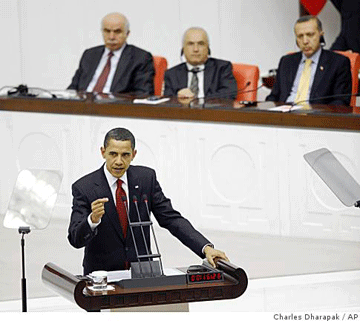
President Obama speaking in Turkey, photograph by Charles Dharapak/AP
by Munir Jiwa, San Francisco Chronicle, Tuesday, April 7, 2009
President Obama has been roundly criticized for his approach thus far to the Muslim world, so it will be interesting to see how the Muslim world receives the words he delivered in Turkey on Monday.
Some critics see Obama’s promise to open a dialogue with the Muslim world as being soft on terrorism. Others wonder why the president would waste time on words, when, they say, now is the time for policies. Others (including Alaa Al Aswany, an Egyptian whose op-ed, “Why the Muslim World Can’t Hear Obama,” was published in February in the New York Times) point to the disappointment felt by Egyptians and others in the Muslim world that President Obama did not take a stand against Israel’s war on Gaza. The criticisms are variations on a theme: Actions speak louder than words.
Many are asking: Will his words matter? And, how might the world benefit now from his words to the Muslim world?
The operative word is “now.” Actions may speak louder than words, but proverbial wisdom also has it that you can’t get there from here. In this case, we can’t get to effective action without words.
Since 9/11, polls studying public opinion in the United States and Muslim-majority countries have revealed mutual suspicion. Muslims have grown accustomed to being labeled as terrorists, suicide bombers and radical extremists, and because of these labels, young Muslims I teach, work and pray with say they have felt marginalized in America.
Yet a significant shift has occurred since Obama’s campaign and his election. While many American Muslims kept their presidential preference to themselves, fearing that an endorsement from Muslims might work against Obama, many are now much more actively participating in the public discourse. This is good news, but misunderstanding built over eight years will take time to abate, and if left unaddressed, can be easily hijacked in the service of divisive agendas, fueling more fear and hatred.
At the Graduate Theological Union in Berkeley where I work, education is centered on interfaith dialogue. In our teaching, research and community conferences, we embrace, rather than avoid, the critical tensions that arise from different perspectives. We do this because one role of religion is to cultivate civic character and virtue so differences in the public arena can be peacefully negotiated.
But finding the common ground we share comes first. In a class I teach on pluralism in Islam, my students ask, “How do we translate respect into action?” I refer them to one hadith or saying attributed to the Prophet Muhammad: “Actions are but by intention.”
An open and inquiring mind, the ability to listen, and the willingness to engage “the other” are the essential precursors to dialogue and cooperation. Ultimately, the work involves intention, words and actions. As my students find their answers, they will become religious leaders and educators who, in addressing issues of pluralism and difference, will help find resolutions to geopolitical, economic and social problems.
In an interview with Hisham Melhem of Al Arabiya, President Obama emphasized, along with respect, the importance of listening. These are critical starting points in rebuilding a relationship with those who practice the world’s fastest growing religion. They are the way to find what President Obama called “certain common hopes and common dreams” that unite all people regardless of their faith. President Obama’s approach to the Muslim world is a nuanced one: It is neither a closed nor an open fist; neither soft nor hard line: It is an opening.
His invitation in Turkey to “broader engagement based upon mutual interest and mutual respect” may show the way to the eventual actions that help millions of Muslims create better lives for themselves and their children and build world security. Indeed, President Obama’s words to the Muslim world do – and will – matter a great deal. They may be our best chance to overcome preconceptions and get down to the work of peace building.
Munir Jiwa is a professor of Islamic Studies and director of the Center for Islamic Studies at the Graduate Theological Union in Berkeley.